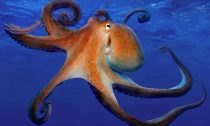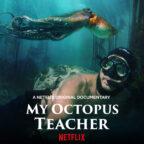
Plans to create octopus farms in coastal waters round the world have been denounced by an international group of researchers. They say the move is ethically inexcusable and environmentally dangerous, and have called on private companies, academic institutions and governments to block funding for these ventures.
The researchers say that farming octopuses would require the catching of vast amounts of fish and shellfish to feed them, putting further pressure on the planet’s already threatened marine livestock.
The group, led by Professor Jennifer Jacquet of New York University, argues that octopuses are highly intelligent, curious creatures. Farming them intensively would probably cause large numbers of deaths from stress. “We can see no reason why, in the 21st century, a sophisticated, complex animal should become the source of mass-produced food,” Jacquet told the Observer. “Octopuses eat fish and shellfish, and supplying enough to feed large numbers of them puts further pressure on the food chain. It is unsustainable. Octopus factory farming is ethically and ecologically unjustified.”
There are about 300 species of octopus and many behave in surprisingly sophisticated ways. Some have been shown to use tools, for example. In one experiment, scientists observed octopuses building shelters from pieces of coconut shell. “Once octopuses have solved a problem, they retain long-term memory of the solution,” the researchers state in a paper in Issues in Science and Technology.
But octopuses are also a culinary delicacy. About 350,000 tonnes are caught every year and served in restaurants from Spain to Chile and from Mexico to Australia. But many octopus fisheries are reported to be in decline, and fish farmers have turned to rearing of octopuses to try to replace these dwindling catches. Wild-caught males and females would be allowed to mate, and their fertile eggs would be grown in containers into adults to be sold to markets round the globe.
These efforts have foundered, however, because octopus larvae eat only live food – which has made feeding them difficult and expensive. Keeping young animals in water whose salinity and temperature are carefully controlled has also proved tricky.
These drawbacks have prevented octopus farms from making progress – until recently. Aquaculturists have learned that the young of some octopus species are less fussy about the food they eat and have used these species as basic stock for breeding. There have also been advances in controlling the environments in which octopuses will be raised.
As a result, several companies have said they will soon be ready to sell farmed octopuses. The Japanese seafood company Nissui is one has reported hatching octopus eggs in captivity and has predicted it will be selling market-ready octopuses next year. Other companies, in Mexico and Australia, have also reported that they will be selling their own varieties in the near future.
But the case for octopus farming is weak, according to Jacquet and her co-authors. The main markets for the animals – the US, Europe, Japan and China – are areas where people are already well-fed. Octopuses are delicacies and do not deserve to be the focus of intensive farming.
At present, these farms are still at the development stage, said Peter Godfrey-Smith of Sydney University, a contributor to the paper. “That means campaigners and activists don’t have products or outlets to target. But when universities and research institutions consider supporting these projects – and that is beginning to happen now – it will make sense to object. Why should research money be used to support a project that will inevitably have so many welfare and environmental problems once it is scaled up?”












Social Profiles